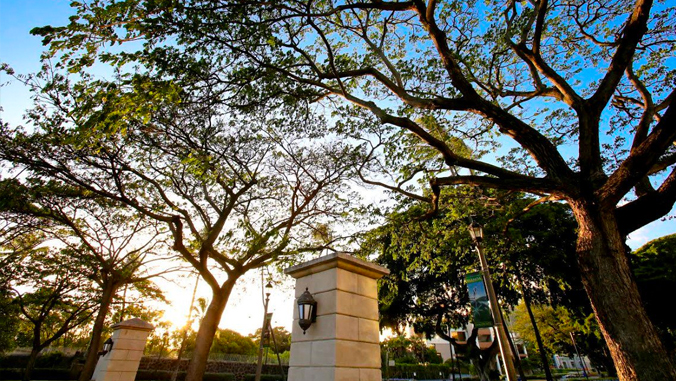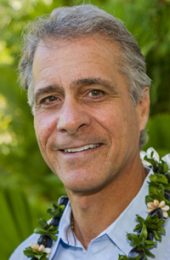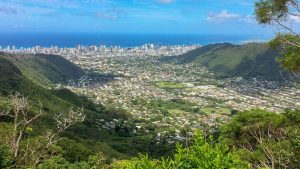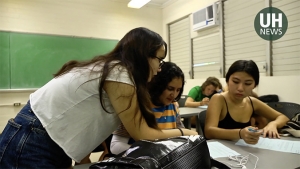
Aloha Campus Community,
Happy New Year!
I hope that you have returned refreshed after spending time with your family and friends over the holiday season. The start of a new year is a time of gratitude, reflection, and anticipation, and so it seems like an appropriate time to share with you a few updates on several initiatives that I believe will help move the campus forward in ways that build on our mission, emphasize our strengths, and address our challenges.

Strategic Plan Update: In 2018, I charged the strategic planning committee to revisit our goals and update the mission and vision statements for the campus. The effort was guided by a series of campus conversations with students, faculty, and staff who shared their thoughts on where we are and where we aspire to be as a university in the next five years. Inspired and informed by these conversations, the committee prepared a first draft of the plan, which was shared with the campus electronically in early 2019. Your feedback informed the final version of the plan which will be shared with you shortly.
Accreditation Reaffirmation Review: UH Mānoa, which is accredited by the Senior Commission of the Western Association of Schools and Colleges, is scheduled for a reaffirmation review in the spring of 2021. Owing to the success of our previous review, the upcoming review will be conducted under a new approach to accreditation where we will demonstrate our compliance with accreditation standards by focusing on themes and issues of importance to our campus. A steering committee composed of faculty, staff, and students proposed Aloha ʻĀina as our overarching theme, with Transformational Student Success and Academic Innovation & Engaged Learning as ancillary themes. We encourage you to engage with our themes, all of which align closely with the updated strategic plan.
Commission to Address Racism and Bias: As you know, I am creating a commission of faculty, students, and staff to examine how we have responded as a community to challenging and sometimes polarizing issues, including but not limited to TMT, and how we move forward together. The commission will approach the issues from multiple perspectives, leveraging many existing resources and ongoing initiatives. We invite you to submit nominations to serve on the commission (self-nominations also welcome). Please submit nominations, including a brief statement of interest, to provost@hawaii.edu by Thursday, January 16, 2020.
Sciences and the Sacred Lecture Series: My office, together with the Biocultural Initiative of the Pacific, and the Sea Grant Center of Excellence in Integrated Knowledge Systems (SOEST), is hosting this lecture series which pairs Native Hawaiian cultural practitioners with UH Mānoa faculty members to discuss topics related to Maunakea. The series resumes this month with a lecture on Biodiversity and Climate/Ecological Zones on Maunakea.

Institute for Sustainability & Resilience (ISR): ISR serves as the campus-wide interdisciplinary home for instructional, research, and outreach programs relating to sustainability and resilience, and fosters multidisciplinary programs that empower students to meet the critical challenges of bridging local to global problems and their solutions. The Institute, which serves as the home for our cross-listed Sustainability (SUST) courses, recently launched a new BA in Sustainability offered through Interdisciplinary Studies, effective Spring 2020. Undergraduate and graduate-level certificate programs are currently under review.
Center for Microbiome Analysis through Island Knowledge and Investigation (C-MĀIKI): C-MĀIKI fosters cutting-edge microbiome research by leveraging the ecology, geography, and cultures of Hawaiʻi to better understand and model microbiome dynamics. Funded by an initial investment of $700,000 through the 2017 Strategic Investment Competition, today C-MĀIKI is composed of 20 researchers from the Pacific Biosciences Research Center, SOEST, CTAHR, JABSOM, Natural Sciences, and Engineering. Since that initial investment, C-MĀIKI has generated more than $11 million in extramural funding to support research and curriculum development.
Hawaiʻi Data Science Institute (HI-DSI): HI-DSI provides interdisciplinary research and education related to data, computation, and visualization. Strong capacity in this area, variously referred to as data science, data analytics, data visualization, and “big data,” is increasingly essential to our research enterprise across nearly every field of study. HI-DSI provides the coordinating infrastructure to create capacity in support of interdisciplinary research grants, articulates priorities for campus investment, and facilitates the development of new academic programs to meet student and workforce needs in the state.
Strategic Investment Competition: The Strategic Investment Competition was designed to increase cross-unit and cross-disciplinary collaboration in strategic areas that, with start-up funding, have a strong possibility for success. The first competition, launched in 2017, provided start-up funding for initiatives as diverse as leading-edge research into the earth’s microbiome (C-MAIKI), to a symphony and associated educational resources to bring attention to Hawaiʻi’s endangered birds (Symphony of the Hawaiian Birds). I am pleased that nearly all of the proposals funded in 2017 have become ongoing programs that elevate the quality and impact of our university’s work. We launched a competition in late 2019 with a request for proposals around the theme of High-Impact Practices in Undergraduate Education. An impressive set of 42 proposals are currently under review for funding. We look forward to sharing the successful proposals with you shortly.
 Learning Assistant Program Expansion: A Learning Assistant (LA) is an undergraduate student who facilitates discussion and engagement by working with students in small groups during class to encourage active participation. We piloted the program in 2017 in quantitative reasoning courses and found that student learning markedly improved in classes with LAs. We are in the process of expanding this promising program campus-wide to address high DFWI rates in selected 100- and 200-level courses across multiple disciplines.
Learning Assistant Program Expansion: A Learning Assistant (LA) is an undergraduate student who facilitates discussion and engagement by working with students in small groups during class to encourage active participation. We piloted the program in 2017 in quantitative reasoning courses and found that student learning markedly improved in classes with LAs. We are in the process of expanding this promising program campus-wide to address high DFWI rates in selected 100- and 200-level courses across multiple disciplines.
These are just a few of the many initiatives and events on the horizon. As you prepare for the start of the semester, I encourage you to take advantage of all that the semester has to offer, both inside and outside of the classroom, and to contact me with feedback and suggestions.
Finally, I would like to thank you for your contributions as a member of this great public university ʻohana. I am incredibly fortunate and grateful to work with you as we continue to chart our course together.
Mahalo nui loa,
Michael Bruno, Provost

